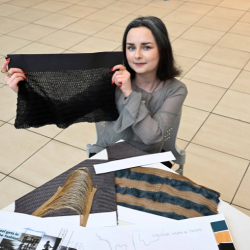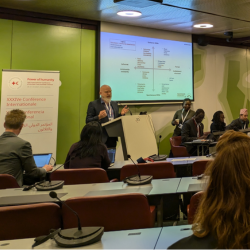-
Study
-
Quick Links
- Course Search
- Unlock Your Potential
- Still time to Apply
- Higher and Degree Apprenticeships
- Continuing Professional Development
- Book an Open Day
-
Undergraduate
- Course Search
- Application Guides
- UCAS Exhibitions
- Foundation Years
- Fees and Funding
- School & College Outreach
- Information for Parents
-
Postgraduate
- Course Search
- Application Guide
- Postgraduate Research Degrees
- Flexible Learning
- Fees and Funding
- Change Direction
- Register your Interest
-
Student Life
- Students' Union
- The Hub - Student Blog
- Accommodation
- Northumbria Sport
- Support for Students
-
Experience Northumbria
- Open Days & Events
- Virtual Tours
- Campus Tours
- Life in Newcastle
-
-
International
International
Northumbria’s global footprint touches every continent across the world, through our global partnerships across 17 institutions in 10 countries, to our 277,000 strong alumni community and 150 recruitment partners – we prepare our students for the challenges of tomorrow. Discover more about how to join Northumbria’s global family or our partnerships.
View our Global Footprint-
Quick Links
- Course Search
- Undergraduate Study
- Postgraduate Study
- Information for Parents
- London Campus
- Northumbria Pathway
- Sign up for Information
-
International Students
- Information for Students
- International Events
- Application Guide
- Entry Requirements and Education Country Agents
- Global Offices
- English Requirements
- English Language Centre
- International student support
-
International Fees and Funding
- International Undergraduate Fees
- International Undergraduate Funding
- International Masters Fees
- International Masters Funding
- International Postgraduate Research Fees
- International Postgraduate Research Funding
-
International Partners
- Agent and Representative Network
- Global Partnerships
- Global Community
-
International Mobility
- Information for Northumbria Students
- Information for Incoming Exchange Students
-
-
Business
Business
The world is changing faster than ever before. The future is there to be won by organisations who find ways to turn today's possibilities into tomorrows competitive edge. In a connected world, collaboration can be the key to success.
More on our Business Services -
Research
Research
Northumbria is a research-rich, business-focused, professional university with a global reputation for academic quality. We conduct ground-breaking research that is responsive to the science & technology, health & well being, economic and social and arts & cultural needs for the communities
Discover more about our Research -
About Us
-
About Northumbria
- Our Strategy
- Our Staff
- Place and Partnerships
- Leadership & Governance
- Academic Departments
- University Services
- History of Northumbria
- Contact us
- Online Shop
-
-
Alumni
Alumni
Northumbria University is renowned for the calibre of its business-ready graduates. Our alumni network has over 246,000 graduates based in 178 countries worldwide in a range of sectors, our alumni are making a real impact on the world.
Our Alumni - Work For Us
What will I learn on this module?
This module will develop knowledge and skills in a range of professional and clinical skills including the study of normal anatomy, physiology and movement. The study of normal anatomy is applied to movement scenarios and the analysis of key functional tasks and how these relate to common clinical presentations. A series of case studies explore some of these common clinical presentations and drive learning through an enquiry-based approach, designed to foster collaborative learning amongst learners. Student led presentations help demonstrate knowledge gained around these case studies and drive the clinical skills that apply to clinical settings. Further skills in moving and handling are delivered through practical workshops and help develop a skillset to support safe and effective practice of foundation Physiotherapy skills that transfer to clinical environments, from the very beginning of the programme.
The module assessment strategy will provide you with the opportunity to recontextualise your prior learning and life experience, directly apply to clinical practice through a rigorous, highly practical and enjoyable enquiry-based learning approach.
This module also houses your first periods of clinical placement and you will be encouraged to consider the HCPC and CSP standards and use reflective skills to identify your learning needs in relation to these. You will have the opportunity to practice Physiotherapy therapeutic skills in a “real” environment in a variety of practice placement areas with the support of University and Clinically based supervisors. This experience will consolidate the skills that you have developed within the University and enable you to understand the links between theory and practice.
How will I learn on this module?
This module introduces you to the fundamental skills required of a physiotherapist and seeks to re-contextualise your previous study and life experiences. A practical and enquiry-based approach to learning will explore the fundamental skills of Physiotherapy in the areas of anatomy, functional analysis, common clinical skills and moving and handling. The module thus seeks to develop your abilities in the assessment of function, understanding of movement and professional communications and conduct.
Teaching will be delivered via a series of practical workshops where you will be expected to practice handling and palpation techniques alongside other students and case-study presentations where enquiry-based skills and presentation skills will be demonstrable. Occasional lecture-based teaching will be included to help introduce new topics. This will be supported by directed and independent study. A range of online resources has been developed to facilitate key skills in anatomy and also, moving and handling techniques. The module is assessed by practical exam, where you will be asked to demonstrate knowledge of anatomy, physiology and pathology of a given joint.
Working to meet the standards necessary for professional registration, you will have the opportunity to further progress your skills in the practice environment through clinical practice placement-based learning periods across the year. During these periods, you will have the opportunity to integrate your learning from co-requisite modules to evaluate and further advance your communication, collaborative and inter-professional working abilities and develop and safe and effective practice in the “real world”.
You will be expected to:
• Attend teaching sessions
• Be dressed appropriately for practical sessions and for clinical placement
• Behave in a professional manner
• Engage and contribute to the learning and development of yourself and others
How will I be supported academically on this module?
Module information, assessment requirements and expectations, and important module announcements will be made through the eLP. Material to support your learning will be uploaded in advance of sessions. You will be signposted to content via the module booklet and also verbally during timetabled sessions. Online resources are available through the University learning platform and are used to support your directed learning, demonstrate the required level of detail and content required. The Module Leader is there to support you with any queries that you may have about the module content. You will have the opportunity to receive formative feedback on your development during the module, and you will receive feedback on summative work to help you identify areas of strength and areas for development. There will be the opportunity to discuss your feedback with a member of staff during taught sessions or by face to face or online tutorials as necessary. There are also further academic skills support available from the University Library services. You will have the opportunity to practice and frame skills (practical and intellectual) and are encouraged to evidence these in the compilation of a portfolio in a format of your choosing to showcase your learning within the academic setting. The portfolio, however, does not form part of the summative assessment and should act as a vehicle for reflection on your skills. During placement you will work with an experienced physiotherapists who will guide your professional development in the context of the specific physiotherapy setting. You will use a portfolio of learning to make links between the university and practice based learning.
What will I be expected to read on this module?
All modules at Northumbria include a range of reading materials that students are expected to engage with. Online reading lists (provided after enrolment) give you access to your reading material for your modules. The Library works in partnership with your module tutors to ensure you have access to the material that you need.
What will I be expected to achieve?
Knowledge & Understanding:
1. Integrate knowledge of normal anatomy, physiology, functional analysis and movement to specific case-studies, and apply effective assessment and treatment planning for patients with a range of common pathologies.
2. Demonstrate safe and effective moving and handling skills for a variety of physical disabilities.
Intellectual / Professional skills & abilities:
1. Integrate professional competencies to practice contexts, with patient and health professional interactions.
2. Demonstrate an enquiry-based learning approach to common clinical scenarios and apply these to a range of practice contexts in order to meet the goals of a MSc in Physiotherapy.
Personal Values Attributes (Global / Cultural awareness, Ethics, Curiosity) (PVA):
1. Practice in a non-discriminatory manner and demonstrate awareness of the impact of culture, equality and diversity on practice.
How will I be assessed?
Module formative assessment opportunities are provided within developmental Structured Practical Evaluation workshops staged at points across the module, along with compilation of a non-mandatory e-skills portfolio. Feedback as an inclusive activity by students, peers, and staff will be undertaken
The module summative assessment will be in two parts, a practical viva and on placement.
Practical viva
This provides the opportunity to demonstrate your underpinning knowledge of normal anatomy, common pathologies and their likely clinic presentation; safe and effective therapeutic handling skills and the effective assessment of common clinical conditions. Individual written feedback will be provided with the opportunity to discuss with a module tutor. General cohort feedback will be provided via the e-learning platform.
K&U 1,2; IPSA 1,2; PVA 1
Placement:
Formative assessment: You will receive feedback on your professional development during seminars and workshops and in pre and post placement tutorials where you will reflect on and plan for your placement learning. During placement there will be ongoing formative assessment of practice where strengths and areas for development are identified. This will be supported through regular supervision meetings between the student and the practice educator.
Summative assessment: Level 6 Practice Placement Competencies
You will be assessed by your Practice Educator on a pass/fail basis in line with specified level 6 competencies. You will receive written and verbal feedback on your strengths and areas for development from your Practice Educator
Pre-requisite(s)
N/A
Co-requisite(s)
N/A
Module abstract
The module develops the skills to support safe and effective practice of foundation Physiotherapy skills that apply within clinical environments from the very beginning of the programme.
The module develops knowledge and skills in relation to a range of professional and clinical skills required to practice successfully during the early placements of the programme. These include the analysis of normal anatomy, physiology and movement, and how this informs common clinical presentations. Case-study driven interactive workshops, encourage you to reflect and develop behaviours and values that underpin the professional codes of conduct and develop safe and effective clinical skills.
The module assessment strategy allows you to demonstrate and showcase these skills and to deliberate the key issues associated with these case-studies. The module applies directly to clinical practice through a rigorous, highly practical and enjoyable enquiry-based learning approach.
Course info
Credits 20
Level of Study Postgraduate
Mode of Study 2 years Full Time
Department Sport, Exercise and Rehabilitation
Location Coach Lane Campus, Northumbria University
City Newcastle
Start January 2026
All information is accurate at the time of sharing.
Full time Courses are primarily delivered via on-campus face to face learning but could include elements of online learning. Most courses run as planned and as promoted on our website and via our marketing materials, but if there are any substantial changes (as determined by the Competition and Markets Authority) to a course or there is the potential that course may be withdrawn, we will notify all affected applicants as soon as possible with advice and guidance regarding their options. It is also important to be aware that optional modules listed on course pages may be subject to change depending on uptake numbers each year.
Contact time is subject to increase or decrease in line with possible restrictions imposed by the government or the University in the interest of maintaining the health and safety and wellbeing of students, staff, and visitors if this is deemed necessary in future.
Useful Links
Find out about our distinctive approach at
www.northumbria.ac.uk/exp
Admissions Terms and Conditions
northumbria.ac.uk/terms
Fees and Funding
northumbria.ac.uk/fees
Admissions Policy
northumbria.ac.uk/adpolicy
Admissions Complaints Policy
northumbria.ac.uk/complaints









